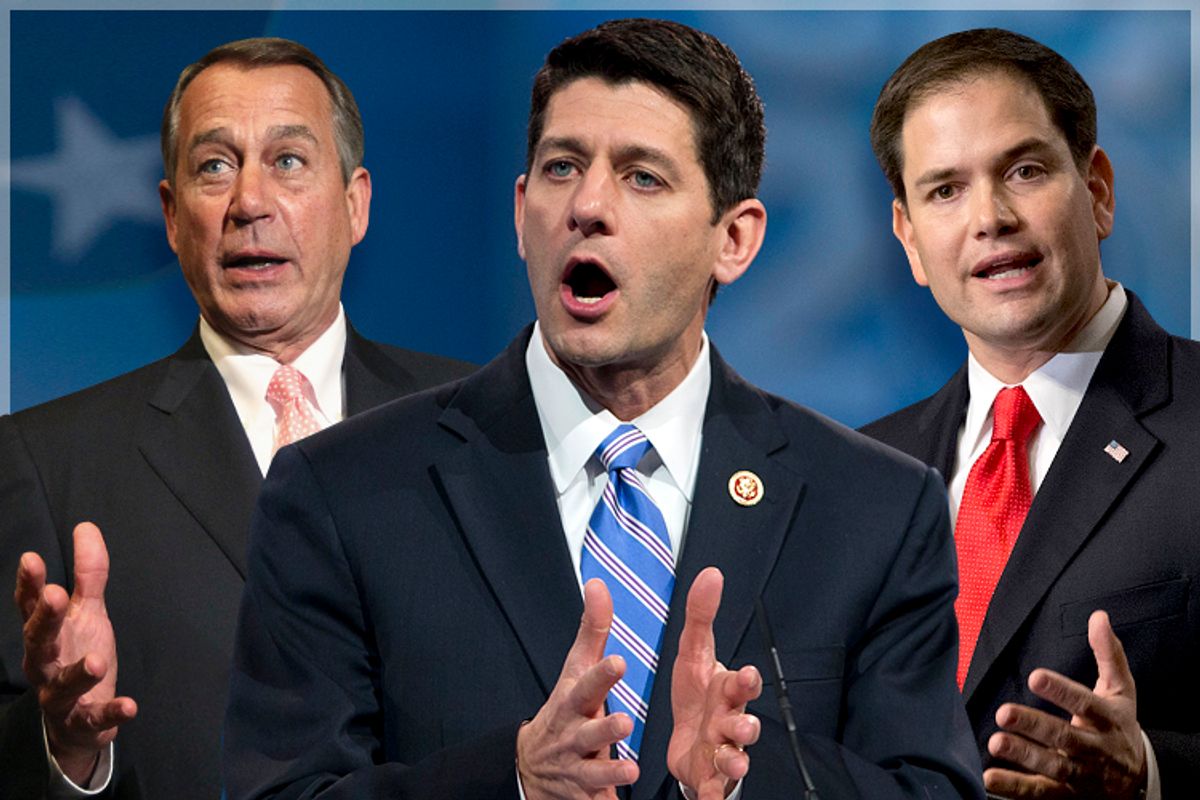It’s heartwarming to see how quickly Rep. Paul Ryan’s new poverty report has been debunked and discredited. The Center on Budget and Policy Priorities has the most exhaustive takedown, but the Fiscal Times report featuring scholars who said Ryan misrepresented their work in order to discredit anti-poverty programs was devastating, too. What’s become clear in the last two days is that, just like Paul, his fellow Republicans have absolutely no plans to fight poverty except, perhaps, repealing the 20th century.
As I noted Tuesday, Ryan did single out one anti-poverty program he likes: the earned income tax credit, which helps low-wage parents by eliminating their tax burden or giving them a refundable tax credit. President Obama, always on the lookout for areas of compromise, quickly responded, with a budget proposal that expands the credit to benefit 13.5 million workers and increases what it provides them. Obama would pay for the EITC expansion by eliminating the ugly “carried interest” loophole, which lets certain investment bankers evade taxes, along with another tax break for wealthy self-employed individuals.
What was Ryan’s response? He dismissed Obama’s budget as a “campaign brochure.” House Speaker John Boehner, meanwhile, called it the president’s “most irresponsible budget yet.” Sen. Marco Rubio, who briefly pretended to care about poverty, specifically denounced Obama's EITC expansion. "I am concerned by the President’s call to expand the status quo on the Earned Income Tax Credit. We should be reforming this flawed approach to helping low-income workers, not expanding it."
Meanwhile, the Center for American Progress is out with a new report showing that hiking the federal minimum wage to $10.10 an hour would save $4.6 billion in food stamp benefits. Benefiting 15 percent of the American workforce, such a hike would lift almost a million workers out of poverty. The Economic Policy Institute has estimated that it would also increase GDP by roughly $32.6 billion and create approximately 140,000 new jobs.
But the minimum wage hike is DOA in the House. Paul Ryan, champion of the poor, calls a minimum wage hike “bad economics” and says it hurts not helps poor people. “Look, what we want are more people to enter into the workforce. We don’t want to make it more expensive for employers to be able to hire people,” he told CNBC’s Squawk Box in January. “With these horrible labor force participation rates, what matters most is getting people into the workforce, then getting the skills and the economic growth that allows them to get a better paying job.”
Republicans have always claimed, with little evidence, that a minimum wage hike would kill jobs, and they got some backing from a CBO report that said the proposed hike could shave up to 500,000 jobs over several years. Most other studies, it should be noted, find no such impact.
But GOP worries about job loss can’t be taken seriously, either. As the New York Times reports, cuts to extended unemployment insurance and the SNAP program will cost the economy at least 275,000 jobs. Public sector employment alone has fallen by over 600,000 in the last three years, because of public spending cuts – and that’s during an economic recovery.
But you know what’s actually improving the economy? The Affordable Care Act. The Wall Street Journal reports that the law “is already boosting household income and spending.” Spending rose an unusually high 0.4 percent in January while personal incomes jumped 0.3 percent, and the WSJ says the ACA’s expanded Medicaid benefits and insurance subsidies “accounted for a big chunk of the increase on both fronts.” But the House just took its 50th vote to repeal the ACA.
Ryan insists the War on Poverty created a “poverty trap.” It’s clear what the real poverty trap is: Republicans who resist every effort to improve the lives of American workers.

Shares